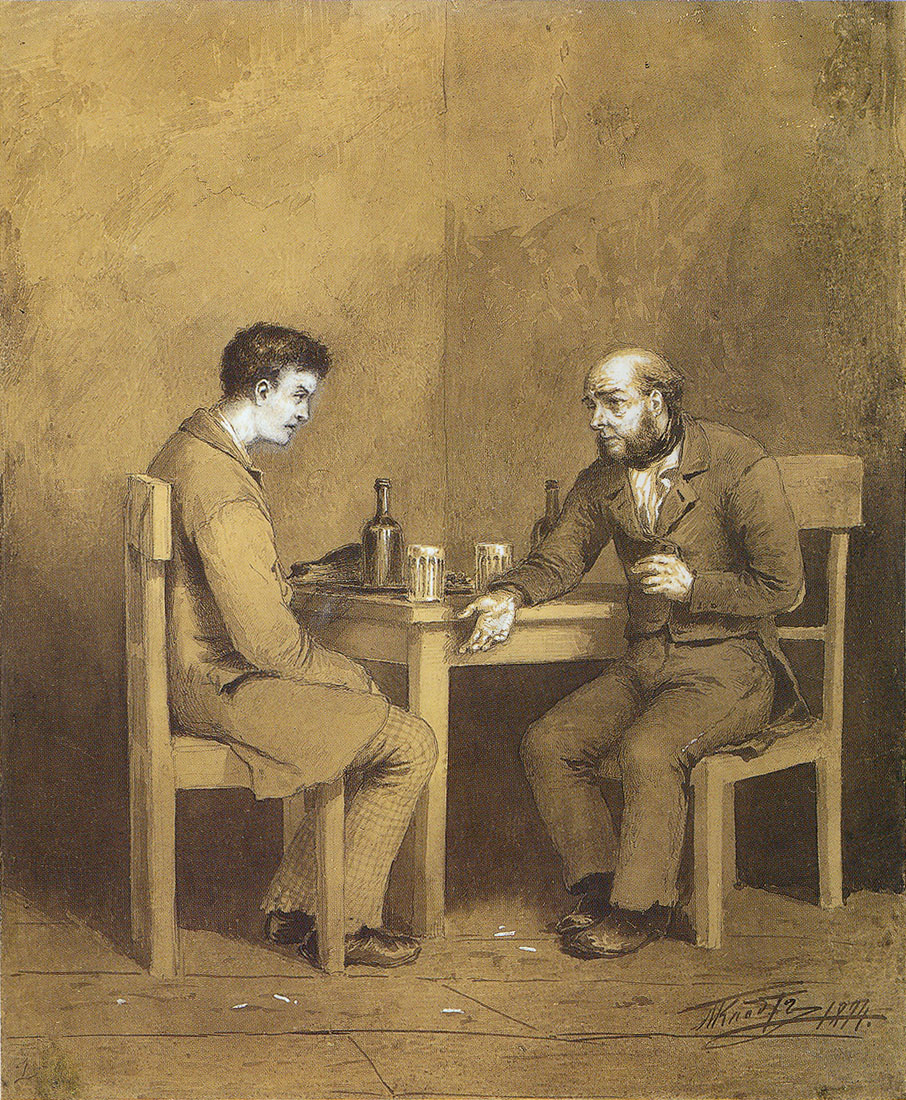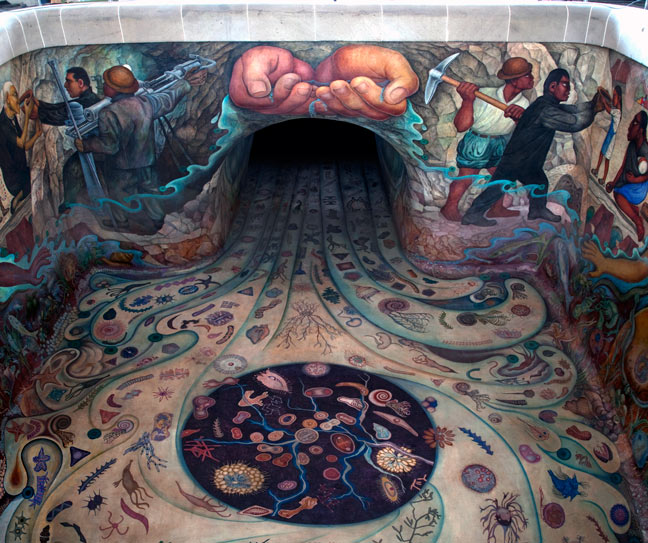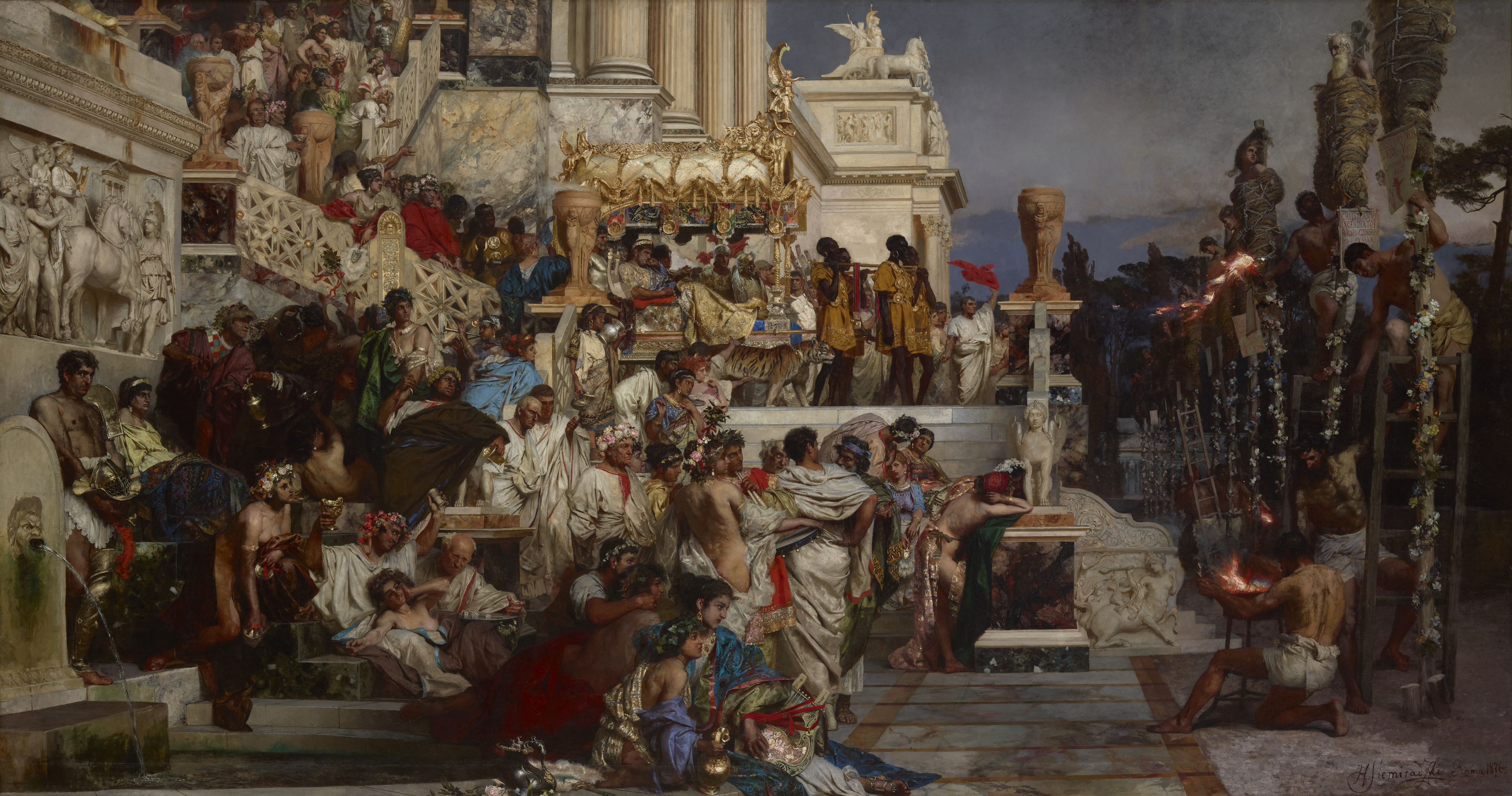Wiki-Menu: 1·
2·
A·
B·
C·
D·
E·
F·
G·
H·
I·
K·
L·
M·
N·
O·
P·
Q·
R·
S·
T·
U·
V·
W·
Y·
Z
Hawkins-Menu: A·
B·
C·
D·
E·
F·
G·
H·
I·
J·
K·
L·
M·
N·
O·
P·
Q·
R·
S·
T·
U·
V·
W·
Z
|
Neuroimaging of the seat of suffering
|
|
Wir wissen, dass die Trübsal Ausharren bewirkt, das Ausharren aber Bewährung, die Bewährung aber Hoffnung, Hoffnung aber lässt nicht zuschanden werden.
Paulus, Brief an die Römer 5, 4-5 (NT)
|
Zitate zum Thema Leiden / Suffering
Zitate allgemein
Selbst in Bedrängnissen rühmen wir uns, weil wir wissen, dass wir durch Leiden Geduld lernen;
und wer Geduld gelernt hat, ist bewährt, und das wiederum festigt die Hoffnung. Römer 5, 3-4 (NT)
Persönliche Bekenntnisse
- So sehr mich das Problem des Elends in der Welt beschäftigt, so verlor ich mich doch nie im Grübeln darüber, sondern hielt mich an dem Gedanken, dass es jedem von uns verliehen sei, etwas von diesem Elend zum Aufhören zu bringen. So fand ich mich nach und nach darein, dass das Einzige, was wir an jenem Problem verstehen könnten, dies sei,
dass wir unsern Weg als solche, die Erlösung bringen wollen, zu gehen hätten. Albert Schweitzer (1875-1965) deutsch-
elsässischer Arzt, evangelischer Theologe, medizinischer Missionar, Kulturphilosoph, Humanist, Organist, Friedensnobelpreisträger, 1952, Autor, Das Albert Schweitzer Lesebuch, S. 315, C.H.Beck, München, 4. Auflage, 25. August 2009

Lachsbeere in Blüte
Empfehlungen
- Deine Schmerzen sind Boten – höre auf sie.
- Leiden lehrt nicht!
Leiden erhebt nicht!
Leiden muss nicht sein!
Erwarte vom Leiden weder Frucht noch Gutes!
Empfange das Leiden als einen Boten des Himmels,
doch lass ihn weiterziehen, wenn er scheiden will.
Gitta Mallasz (1907-1992) ungarische Grafikerin, Malerin, Lela Fischli, Die Antwort der Engel. Ein Dokument aus Ungarn, Himmlische Pädagogik, Lektion XII, Erstaufzeichnung 25. Juni 1943, Daimon Verlag, 12. Auflage Juni 2005
Schlussfolgerungen
- Nicht die Vergänglichkeit sorgt dafür, dass wir leiden. Wir leiden weil wir wollen, dass Dinge für immer da sind und gleich bleiben, auch wenn dem nicht so ist. Thich Nhat Hanh (1926-2022) vietnamesischer buddhistischer Mönch, Lehrer, Friedensaktiver, Dichter, Autor, Melvin McLeod, Herausgeber, The Pocket Thich Nhat Hanh, Shambhala, 11. September 2012
- Wer nicht leiden will, muss hassen. Horst Eberhard Richter (1923-2011) deutscher Psychoanalytiker, Psychosomatiker, friedensbewegter Sozialphilosoph, Autor, Wer nicht leiden will, muß hassen. Zur Epidemie der Gewalt, Hoffmann und Campe, Hamburg, 1993, Psychosozial-Verlag, Taschenbuchauflage 1. Juni 2007
- Ich glaube nicht, dass bloßes Leiden als Lehre genügt. Wäre ausschließlich das Leiden der Lehrmeister, wäre die ganze Welt weise, denn ein jeder leidet. Zum Leiden hinzukommen müssen auch Trauer, Verständnis, Geduld,
Liebe, Offenheit und die Bereitschaft, verletzlich zu bleiben.
Diese und andere Faktoren zusammengenommen – vorausgesetzt die Umstände sind günstig – können eine Lektion erteilen und eine Neuwerdung herbeiführen.
Anne Morrow Lindbergh (1906-2001) US-amerikanische Pionierpilotin, Autorin, Ehefrau des Piloten Charles Lindbergh, Hour of Gold, Hour of Lead. Tagebücher und Briefe von Anne Morrow Lindbergh, 1929-1932, S. 3, Houghton Mifflin, 1. Auflage 12. März 1973
Reue – Schuld – Wiedergutmachung
- Wo mag im Falle selbst-verschuldeten Leidens der Sinn liegen? Nun, das Leiden, das durch eine schlechte Handlung gesetzt wurde, lässt sich immer noch durch eine rechte Handlung wiedergutmachen, und solche Wiedergutmachung nennt man bekanntlich Sühne. Wie ist es aber dann bestellt, wenn etwas nicht wieder gut zu machen ist, zumindest nicht im Sinne von Sühne, also nicht durch eine rechte Handlung? Dann kommt es nur umso mehr auf die rechte Hal-
tung an, auf die richtige Einstellung, jetzt aber nicht gegenüber dem Leid an sich und als solchem, vielmehr gegen-
über der Schuld. Und die rechte Haltung gegenüber der eigenen Schuld ist die Reue. […]
Die Reue ist eine Haltung und Einstellung einem selbst gegenüber bzw. dem früheren, schuldigen Ich gegenüber. Wie sehr die Reue, wenn schon nicht wiedergutmachen, so doch wenigstens auf moralischer Ebene rückgängig machen kann, was geschehen ist und verschuldet wurde, hat uns Max Scheler in seinem diesbezüglichen Aufsatz Reue und Wiedergeburt gezeigt. Viktor E. Frankl (1905-1997) österreichischer Psychiater, Psychotherapeut, Neurologe, KZ-Überlebender, Sinnforscher, Begründer der Logotherapie, Autor, Logotherapie und Existenzanalyse. Texte aus sechs Jahrzehnten, S. 131-132, Beltz, 3. Taschenbuchauflage 19. Juli 2010
- Was Ruhe, Freude nicht erreicht, wird wohl das Leid zuletzt vollbringen. Und wenn das bisherige Leiden dazu noch nicht ausreichte, so muss es schwerer, härter kommen als zuvor, und einmal wird der Punkt erreicht, wo jedes hart-
näckige Widerstreben bricht, oder sich fügt. Zwischen dem Brechen und Sichfügen hat der Einzelmensch noch immer freie Wahl, da er den Lohn für beides ernten muss je nach der Art, wie sein Entschluss dann fällt.
Oskar Ernst Bernhardt (Abd-ru-shin) (1875-1941) deutscher spiritueller Autor, Gründer der Gralsbewegung, Autor, Im Lichte der Wahrheit'', Vortrag Nr. 83 "Berufen", Verlag Alexander Bernhardt, Vomperberg, Tirol, Ausgabe letzter Hand, 1. Januar 2011
- Leiden schlägt das Behagen unserer normalen Empfindungen über die Realität in Stücke und zwingt uns, in einem besonderen Sinn, lebendig zu werden, sorgfältig zu schauen, tief zu empfinden mit uns selber und mit der Welt auf
eine Weise in Berührung zu kommen, die wir bisher vermieden haben. Man sagt, und ich glaube, zu Recht, Leiden
sei die erste Gnade. In bestimmtem Sinn ist Leiden fast eine Zeit der Freude, denn es ist ein Zeichen für den Beginn schöpferischer Einsicht. ⚡ Ken Wilber (*1949) US-amerikanischer mystischer Philosoph, Vordenker des 3. Jahrtausends, transpersonaler Bewusstseinsforscher, Entwickler der Integralen Theorie, Autor, Prof. Dr. phil., Dipl. Psych. Edith Zundel (*1928) deutsche klinische Psychologin, Psychotherapeutin, Soziologin (Herausgeberin), Vom Tier zu den Göttern. Die große Kette des
Seins, S. 28, Herder, Spektrum, Freiburg, 1997
- Wenn es dir schlecht geht, dann hast du die Möglichkeit zur Erkenntnis. OM Cedric Parkin (*1962) deutscher Advaita-Lehrer, Mystiker, Geschäftsmann, Buchautor, Die Geburt des Löwen, S. 99, Lüchow, Taschenbuch, 1. Auflage 1998, Goldmann Arkana, März 2006
- Jedes Festhalten an einer Vorstellung oder einem Ideal, etwas müsste anders sein, als es ist, führt dich in Leiden. OM Cedric Parkin (*1962) deutscher Advaita-Lehrer, Mystiker, Geschäftsmann, Buchautor, Die Geburt des Löwen, S. 108,
Lüchow, Taschenbuch, 1. Auflage 1998, Goldmann Arkana, März 2006
- Leiden steht immer mit einem unerfüllten Wunsch in Zusammenhang. Und letztlich geht es darum herauszufinden,
was dein wirklicher Wunsch ist. OM Cedric Parkin (*1962) deutscher Advaita-Lehrer, Mystiker, Geschäftsmann, Buchautor,
Die Geburt des Löwen, S. 109, Lüchow, Taschenbuch, 1. Auflage 1998, Goldmann Arkana, März 2006
| Referenzen: de.Wikiquote-Einträge ► Leiden und ► Leid |
|
Literaturzitat
- Es kommt alles wieder, was nicht bis zum Ende gelitten und gelöst wird. Hermann Hesse (1877-1962) deutsch-schwei-
zerischer Dichter, Schriftsteller, Nobelpreisträger in Literatur, 1946, Siddharta. Eine indische Dichtung, Fischer, Berlin, 1922, Suhrkamp Verlag, Frankfurt am Main 1969, 1974, 1998; zitiert in: Hermann Hesse für alle Lebenslagen: 10 Zitate, Suhrkamp | Insel
Gedicht
- Gebrannte Kinder
es gibt Kinder die ein gebrannter Finger
davon abhält je wieder mit dem Feuer zu spielen
und
es gibt Kinder die merken
dass eine gebrannte Hand schnell wieder heilt
und
es gibt Kinder die wissen dass man
mit einem gebrannten Arm mehr spürt
und
es gibt Kinder die haben begriffen
dass ein gebranntes Herz immer warm bleibt.
Jörn Pfennig (*1944) deutscher Jazzmusiker, erfolgreicher Lyriker, Grundlos zärtlich. Gedichte, 1979; zitiert in: AZ Quotes
Humor
- Wenn dir ein Fels vom Herzen fällt,
so fällt er auf den Fuß dir prompt!
So ist es nun mal auf der Welt;
ein Kummer geht, ein Kummer kommt.
Heinz Erhardt (1909-1979) deutscher Komiker, Unterhaltungskünstler, Kabarettist, Musiker, Komponist, Schauspieler, Dichter,
Das große Heinz Erhardt Buch, S. 270, Goldmann, München, 1970
↑
General quotes
As I thus praised, a great light appeared to my soul, and in this light God revealed himself in great majesty and indescribable brightness. Our Lord held two golden chalices in his hands that were both full of living wine.
In his left hand was the red wine of suffering,
and in his right hand the white wine of sublime consolation.
Then our Lord spoke:
"Blessed are those who drink this red wine.
Although I give both out of divine love, the white wine is nobler in itself;
but noblest of all are those who drink both the white and the red."
Mechthild of Magdeburg (1207-1282) German medieval mystic, member of the Béguines, visionary, writer,
The Flowing Light of the Godhead, translated and introduced by Frank Tobin, book II, chapter 7, S. 77,
Paulist Press, New York and Mahwah, New Jersey, 1998 |
|
Personal avowals
- The suffering of mankind, I remember that’s what blew me out. You know I was a very strict religionist, one day I was walking through the woods, and out of nowhere came the knowingness and the presentation of the totality of the suffering of mankind throughout all of time. The whole dimension of the agony of the human condition through all of time. How could I believe in a God who would allow that or created that? Because as a naive religionist I thought God was the cause of everything, I didn't realize that what I was looking at was the totality of suffering of the human ego. It was the denial of God that was bringing about all this agony. I saw it but did not re-experience it.
Jesus Christ re-experienced it [suffering of the human ego] and by that earned the right for the
salvation of all of man-
kind. Thank you, oh Lord, thank you Jesus Christ for doing that.
⚡ Dr. David R. Hawkins, Sedona Satsang Q&A,
CD 2 of 2, 10. January 2007
Recommendation
- Pleasure is frail like a dewdrop, while it laughs it dies. But sorrow is strong and abiding. Let sorrowful love wake in your eyes. Rabindranath Tagore (1861-1941) Indian Bengali philosopher, musician, painter, playwright, poet, novelist, Nobel laureate in literature, 1913, The Gardener, 1913, 1938, BookSurge, 1. May 2009
Conclusions
- Neurosis is always a substitute for legitimate suffering. Carl Gustav Jung (1875-1961) Swiss psychiatrist, psychoanalyst, founder of a new school of analytical depth psychology, author, R. F. C. Hull, translator, Psychology and Religion. West and East – Collected Works of C. G. Jung, Volume 11, paragraph 129, 1938, Princeton University Press, 2nd edition January 1975
- It is not impermanence that makes us suffer. What makes us suffer is wanting things to be permanent when they are not. We need to learn to appreciate the value of impermanence. If we are in good health and are aware of imperma-
nence, we will take good care of ourselves. When we know that the person we love is impermanent, we will cherish
our beloved all the more. Impermanence teaches us to respect and value every moment and all the precious things
around us and inside of us. When we practice mindfulness of impermanence, we become fresher and more loving.
Thich Nhat Hanh (1926-2022) Vietnamese France based Buddhist monk, peace activist, teacher, author, Melvin McLeod, editor,
The Pocket Thich Nhat Hanh, Shambhala, 11. September 2012; cited in: Goodreads Quotable Quote
Insights
- We are healed of a suffering only when experiencing it to the full.
Marcel Proust (1871-1922) French critic, essayist, novelist, novel in seven volumes In Search of Lost Time [Original: À la re-
cherche du temps perdu], volume VI The Sweet Cheat Gone, chapter 1 "Grief and Oblivion", issued 1925 (1913-1927)
- The foundation of all mental illness is the unwillingness to experience legitimate suffering. Carl Gustav Jung (1875-
1961) Swiss psychiatrist, psychoanalyst, founder of a new school of analytical depth psychology, author, cited in: AZ Quotes
- There is no coming to consciousness without pain. People will do anything, no matter how absurd, in order to avoid facing their own souls.
Carl Gustav Jung (1875-1961) Swiss psychiatrist, psychoanalyst, founder of a new school of analytical depth psychology, author, Psychology and Alchemy – Collected Works of C. G. Jung, Volume 12, S. 99, 1944, Routledge, London, 2nd edition 1968
- If a man's life consists half of happiness and half of unhappiness, this is probably the optimum that can be reached,
and it remains forever an unresolved question whether suffering is educative or demoralizing.
Carl Gustav Jung (1875-1961) Swiss psychiatrist, psychoanalyst, founder of a new school of depth psychology, author, Gerhard
Adler, editor, Aniela Jaffe, editor, Letters of C. G. Jung. Volume II, 1951-1961, Princeton University Press, 1. April 1976, Routledge,
S. 248, reissued edition 20. May 1976
- As long as we are on earth, the love that unites us will bring us suffering by our very contact with one another, because this love is the resetting of a body of broken bones. Even saints cannot live with saints on this earth without some anguish, without some pain at the differences that come between us.
Thomas Merton (1915-1968) Anglo-American Catholic Trappist monk, mystic student of comparative religion, social activist, poet, writer, New Seeds of Contemplation, S. 72, New Direction, revised edition March 1972
- There is not much sense in suffering, since drugs can be given for pain, itching, and other discomforts. The belief has long died that suffering here on earth will be rewarded in heaven. Suffering has lost its meaning.
Elisabeth Kübler-Ross, M.D. (1926-2004) Swiss US American psychiatrist, death and dying researcher, founder of Near-death studies, author, On Death and Dying, 1969, Scribner, paperback edition 9. June 1997
- Those who have been immersed in the tragedy of massive death during wartime, and who have faced it squarely, ne-
ver allowing their senses and feelings to become numbed and indifferent, have emerged from their experiences with growth and humanness greater than that achieved through almost any other means.
Elisabeth Kübler-Ross, M.D. (1926-2004) Swiss US American psychiatrist, death and dying researcher, founder of Near-death studies, author, Death. The Final Stage of Growth, 1975, Scribner, 1st edition 9. June 1997
- When another person makes you suffer, it is because he suffers deeply within himself, and his suffering is spilling over. He does not need punishment; he needs help. That's the message he is sending.
Thich Nhat Hanh (1926-2022) Vietnamese France based Buddhist monk, peace activist, teacher, poet, author, cited in: Goodreads Quotable Quote
- I do not believe that sheer suffering teaches. If suffering alone taught, all the world would be wise, since everyone suffers. To suffering must be added mourning, understanding, patience, love, openness and the willingness to remain vulnerable.
All these and other factors combined, if the circumstances are right, can teach and can lead to rebirth. Anne Morrow Lindbergh (1906-2001) pioneering US American aviator, aviator, spouse of fellow aviator Charles Lindbergh, author, Hour of Gold, Hour of Lead. Diaries And Letters Of Anne Morrow Lindbergh, 1929-1932, S. 3, Houghton Mifflin, 1st edition 12. March 1973, 1993
- Looking deeply, we can also discover that the wound is a fabrication of a history of relative causes. Suffering exists. And underneath the zones of alienation, suffering does not exist. [...] Our suffering is a sacrifice, but often what
we suffer from can be a gift of strength, like the shamans's wound that becomes the source of his or her compassion.
Roshi Joan Halifax, Ph.D., US American medical anthropologist, former honorary research fellow, Harvard University, The Fruitful Darkness. A Journey Through Buddhist Practice and Tribal Wisdom, S. 15, Grove Press, 1st edited edition 15. March 2004

- Life is suffering. And suffering can make you resentful, murderous and then geno-
cidal, if you take it far enough. [Walls of luxury and delusion will fall apart eventu-
ally.]
The truth is the antidote to suffering. And the reason for that is because the truth puts reality behind you so that you can face the reality that is coming straight at you without becoming weak and resentful and wishing for the destruction of being, becau-
se that's the final hell. [...] The final hell is your soul wishing for the destruction of everything, because it's too painful, and you are too bitter, and that happens to people all the time. Audio interview with Jordan Peterson, Ph.D. (*1962) Canadian clinical psychologist, professor of psychology, University of Toronto, political scientist, author, #877 – Jordan Peterson, presented by The Joe Rogan Experience podcast, host Joe Rogan (*1961) US American actor, comedian, podcaster, sports color commentator, Spotify audio, minute 2:37:33, 2:50:05 minutes duration, 26. November 2016
- Emotional discomfort, when accepted, rises, crests and falls in a series of waves. Each wave washes a part of us away and deposits treasures we never imagined. Out goes naivete, in comes wisdom; out goes anger, in comes discernment; out goes despair, in comes kindness. No one would call it easy, but the rhythm of emotional pain that we learn to tolerate is natural, constructive and expansive. The pain leaves you healthier than it found you.
Article by Martha N. Beck (*1962) US American sociologist, therapist, life coach, author, Guide to Avoiding Avoidance, presented
by the US American monthly magazine O, The Oprah Magazine, February 2006
- It is very difficult also to sacrifice one's suffering. A man will renounce any pleasures you like but he will not give up
his suffering. Man is made in such a way that he is never so much attached to anything as he is to his suffering.
⚡ George Ivanovich Gurdjieff (1866-1949) Greek Armenian metaphysician, composer, choreograph, spiritual teacher of the
"Fourth Way", writer, cited in: Peter D. Ouspensky (1878-1947) Russian esotericist, student of George Ivanovich Gurdjieff,
author, In Search of the Miraculous. Fragments of an Unknown Teaching, S. 274, Harcourt, 1949
- In the West, we generally reject suffering. We see it as an unwelcome interruption of our pursuit of happiness. So we fight it, repress it, medicate it, or search for quick-fix solutions to get rid of it. In some cultures, especially in the East, suffering is acknowledged for the important role it plays in people’s lives, in the meandering path toward enlightenment. Article by Tal Ben-Shahar, Ph.D. (*1970) US American organizational behaviorist, lecturer on positive psychology and leadership, Harvard University, Boston, faculty of the Interdisciplinary Center (IDC), Herzliya, Israel, writer, The Role of Suffering, presented
by the wholebeing institute, ~July 2020
Literary quotes
- Zeus ordained that only in sorrow and in suffering do we find wisdom's way. By suffering we shall gain understanding.
Aeschylus (525/524-456/455 BC) first of the three ancient Greek tragedians, first part of the Greek tragedy Oresteia, play Agamemnon, 5th century BC
- And, indeed, as he listened to the cries of joy rising from the town, Rieux remembered that such joy is always impe-
riled. He knew what those jubilant crowds did not know but could have learned from books: that the plague bacillus
never dies or disappears for good; that it can lie dormant for years and years in furniture and linen-chests; that it bi
des its time in bedrooms, cellars, trunks, and bookshelves; and that perhaps the day would come when, for the
bane and enlightening of men, it would rouse up its rats again and send them forth to die in a happy city.
Albert Camus (1913-1960) French Algeria-born French philosopher, journalist, author, Nobel laureate in literature, 1957, The Plague, final passage, Gallimard (French), 1947; Hamish Hamilton (English), 1948
Poetry
- O joy of suffering!
To struggle against great odds! to meet enemies undaunted!
To be entirely alone with them! to find how much one can stand!
To look strife, torture, prison, popular odium, death, face to face!
To mount the scaffold! to advance to the muzzles of guns with perfect nonchalance!
To be indeed a God!
Song lines
- Plaisir d'amour ne dure qu'un moment, chagrin d'amour dure toute la vie.
[The pleasure of love lasts only a moment. The grief of love lasts a lifetime.] Classical French love song written in 1784, excerpted from: Jean-Paul-Égide Martini (1741-1816) French poet, romance writer, novel Célestine, 1783
↑
Quotes by David R. Hawkins
- There's nothing to feel guilty about and nothing to blame. There's no one to hate, but these are those things that are better avoided, and such blind alleys will become increasingly apparent. Everyone has chosen his own level of consciousness, yet nobody could of done otherwise at any given point in time. We can only get "there" from "here." Every leap has to have a platform to originate from. Pain exists to promote evolution; its cumulative effect finally for-
ces us in a new direction, although the mechanism may be very slow. How many times is it necessary to hit bottom before a lesson is learned? Perhaps thousands, which may account for the sheer quantity of human suffering, so
vast as to be incomprehensible. Slowly, by inches, does civilization advance.
Dr. David R. Hawkins, Power vs. Force. The Hidden Determinants of Human Behavior, chapter 7 "Everyday Critical Point Analysis",
S. 127, Hay House, February 2002
- Stop resisting suffering. Choose to suffer. "I looove to worry, I love the suffering of worry. I love the anxiety of it." You get rid of a thing by choosing. The way to experience a thing is by resisting it. So you only experience what you resist. So choose to worry. Your problem is that you don't worry hard enough. Get up earlier, I want you to sit there and I want you to really, really worry. Promise me you’re going to worry harder. [Gets up from his chair] I want you to promise me that you will start worrying harder. Keep a worry diary of your worry time. Welcome it. Blow the carbon out of the valves.
You perpetuate what you resist. Dr. David R. Hawkins, Sedona Seminar Vision, 3 DVD set, 25. February 2005
↑
Englische Texte – English section on Suffering
Self-sabotaging habits of highly miserable people
| ༺༻ | Miserable behavior |
| 1. | Exaggerated fear of economic loss |
| 2. | Practicing sustained boredom |
| 3. | Negative self-identity |
| 4. | Picking fights |
| 5. | Attributing bad intentions |
| 6. | Acting only for personal gain |
| 7. | Avoiding gratitude |
| 8. | Constant alertness and state of anxiety |
| 9. | Blaming one's parents |
| 10. | Adverse to life's pleasures |
| 11. | Ruminating |
| 12. | Glorifying or vilifying the past |
| 13. | Meddling with romantic partner/s |
| 14. | Criticalness |
|
↑
Excerpt from Crime and Punishment
The Russian author Fyodor Dostoevsky (11.11.1821-9.2.1881) had a violent alcoholic father. He, an epileptic and a gamb-
ler, was an atheistic doubtful subversive revolutionary. During four years of exile with hard labor at a prison camp in Siberia he converted to Christianity and panslawism. His critics view him to be one of the greatest psychologists in world literature. In the 1920s Hermann Hesse deemed him as a "prophet of the twentieth century."

Raskolnikow und Marmeladow.
Illustration von Michail Petrowitsch Klodt, 1874
He had seen rational egoism, utilitarian nihilism, and moral relativism rising up in his native country. His premonitions came true. Dostoevsky was convinced:
"If God doesn't exist – or is not recognized – then anything is permissible."
The main character in Dostoevsky's philosophical novel Crime and Pu-
nishment is named Rodion R. Raskolnikov. His psychogram was as follows:
- Highly talented intellectual poor student, morally superior, instinctively kind, sympathetic and heartless
- Torn between pity and proud idealistic egoism, perverted into
a contemptuous disdain for the submissive herd
Prior to committing a capital crime Raskolnikov had a prophetic horse dream which foreshadowed the nihilistic downturn of Russia. It was about the death of an innocent creature: A mare was tortured and sac-
rificed by a group of drunken men who were taken by a violent binge. His seven year old compassionate dream-self tried to help the beaten up horse in vain. The boy was the only one who protested. The adults would not listen to him and pulled him away. Feeling utterly powerless his heart cramped.
The symbolical message of the horse dream was:
- It implied the impending murder.
- It pointed to the women who sacrificed themselves for impatient men.
Raskolnikov, a hater rather than a lover of his fellow humans, espoused the erroneous theory that humanitarian ends justify evil means. A Napoleon-like morality led him to kill "low life". He murdered a wretched "useless" old moneylender and her witnes-
sing retarded sister to supposedly alleviate the human misery. However, he was unable to steal his victim's money, thereby
failing to meet his calculated standards of committing a "perfect murder". His double crime raised pangs of conscience in him. Seized by nightmarish guilt his life became miserable. For days he was shaken by fever. Mildly insane and restlessly driven
he turned against his mother.
Finally, Sonja, a faithful prostitute, convinced him to report his crime and accept his sentence, which he did.
In prison, Raskolnikov realized:
Resolution / Conclusion: Irrational nonlinear discontinued
"grace" emerging like magic
does soften and finally outshine the rational mean tough guy stance.
Can suffering end suffering? – Apparently yes, as it is evil itself that defeats evil eventually.
Philosopher Vladimir Solovyov on Raskolnikov:
"His boundless self-confidence must disappear in the face of what is greater than himself, and his
self-fabricated justification must humble itself before the higher justice of God."
↑
Emperor Nero persecuting singing Christians
Bread and games will keep the blinded massmind held in cognitive dissonance.
Bloody games of cruelty will find people willing to cheer as long as empathy, insight and spirit are kept afar. |
|
During the reign (54-68 AD) of the 5th Roman emperor Nero (37-68 AD) the early Christians were being persecuted.
They were chosen to serve as the scapegoats of an insane emperor. Afraid of being eaten alive by lions in the Coliseum
the ardent followers of Christ were singing hymns. Praising God in faith, they overcame their fear of death.
Nero, watching the spectacle, exclaimed aghast:
"They're singing! Singing? How can they? Beyond understanding!"
After the lions had feasted on the Christians and the public spectacle was over Nero himself went to inspect the left over dead bodies lying around in the arena. To his disbelief, he found that these strange believers had died with a smile on
their face.
Switching into serenity mode when faced with utter fear of death was indeed beyond Nero's comprehension.
The insane man had felt invicinble by incorporating the rankist paradigm of perpetratorhood and victimhood. |
|
Note: Antidotes to fear [of feared authority figures] are: laughter, singing, acting, whispering, talking to pets or babies. Disabling fears of suppressive authority tend to disappear when one engages in activities that naturally unfold in an atmosphere of trust. Stuttering often vanishes when stutterers are singing or laughing.
It is not possible to eat me without insisting that I sing praises of my devourer? Fyodor Mikhailovich Dostoevsky (1821-1881) Russian writer of novels, short stories and essays, cited in: Goodreads Quotable Quote |
Source: ► Video excerpts from US American movie Quo Vadis, lavish MGM production,
directed by Mervyn LeRoy, starring Robert Taylor, Deborah Kerr and Peter Ustinov, 1951 |
References:
► Blog article Why Did the Romans Persecute Christians?, presented by the blogspot patheos.com, Michael F. Bird, 12. October 2015
► Article The Neurological Causes of Stuttering, presented by SerendipUpdate, Claire Walker, 3. January 2008 |
See also:
► Journey of transformation – Healed from stuttering
► Plato's allegory of the cave
► Cognitive dissonance
► Victimhood and ► Music |
↑
Links zum Thema Leiden / Suffering
Literatur
- F. William Engdahl (*1944) deutsch-US-amerikanischer geopolitischer Analyst, Historiker, Wirtschaftsjournalist, Dozent, Publizist, Die Saat der Zerstörung. Die Geopolitik des Genozids, Kopp Verlag, Rottenburg, 2. überarbeitete Auflage 2007
- Prof. Norman M. Naimark (*1944) US-amerikanischer Historiker, Politikwissenschaftler, Autor, Genozid. Völkermord in der Geschichte, Konrad Theiss Verlag, Stuttgart, 26. März 2018
Literature (engl.)
↑
Externe Weblinks
External web links (engl.)
↑
Audio- und Videolinks
Audio and video links (engl.)
Linkless media offering
- Audio presentation by ⚡ Ken Wilber (*1949) US American transpersonal philosopher, consciousness researcher, thought leader of the 3rd millennium, developer of Integral Theory, author, Integral Education / The Cause of Suffering, directed to students of the John F. Kennedy University, sponsored by the publication Integral Life, Denver, Colo-
rado, 49 minutes duration, Denver, Colorado, April 2010
Audience: students of the John F. Kennedy University
↑
|
Interne Links
Hawkins





